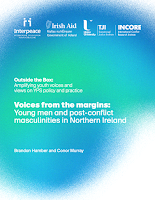“Voices from the Margins: Young men and post-conflict masculinities in Northern Ireland” by Brandon Hamber and Conor Murray is now available online.
The report points to the gap (noted in the YPS Progress Study’s recommendations) on masculinity and masculine identities as part of the gendered approach to implementing the YPS agenda. This policy brief focuses attention on supporting the development of alternative and positive masculine identities. While the paper draws on lived experiences in Northern Ireland, it derives lessons and recommendations, captures stories, and offers a narrative with wider relevance for other contexts.
The report was commissioned by Interpeace for their Outside the Box: Amplifying youth voices and views on Youth, Peace and Security (YPS) policy and practice series.













 Last week David Coyles, Dr Adrian Grant and Professor Brandon Hamber presented research findings to a Knowledge Exchange Seminar Series (KESS) at Stormont on “Hidden barriers and divisive architecture: the case of Belfast”. The research notes that “peace-walls” are particularly symbolic of the role that architecture plays in separating residential communities and a comprehensive scholarship continues to assess their effects, but the research focuses on other barriers in the city. The presentation outlines original findings from a three-year multi-disciplinary academic research project funded by the Arts and Humanities Research Council (AHRC), which extends this current understanding of physical and social division. It reveals new evidence of a distinct and important, yet largely unrecognised, body of divisive architecture; an extensive range of ‘hidden barriers’ embedded in various architectural forms across Belfast’s residential communities. You can download the Policy Brief,
Last week David Coyles, Dr Adrian Grant and Professor Brandon Hamber presented research findings to a Knowledge Exchange Seminar Series (KESS) at Stormont on “Hidden barriers and divisive architecture: the case of Belfast”. The research notes that “peace-walls” are particularly symbolic of the role that architecture plays in separating residential communities and a comprehensive scholarship continues to assess their effects, but the research focuses on other barriers in the city. The presentation outlines original findings from a three-year multi-disciplinary academic research project funded by the Arts and Humanities Research Council (AHRC), which extends this current understanding of physical and social division. It reveals new evidence of a distinct and important, yet largely unrecognised, body of divisive architecture; an extensive range of ‘hidden barriers’ embedded in various architectural forms across Belfast’s residential communities. You can download the Policy Brief,